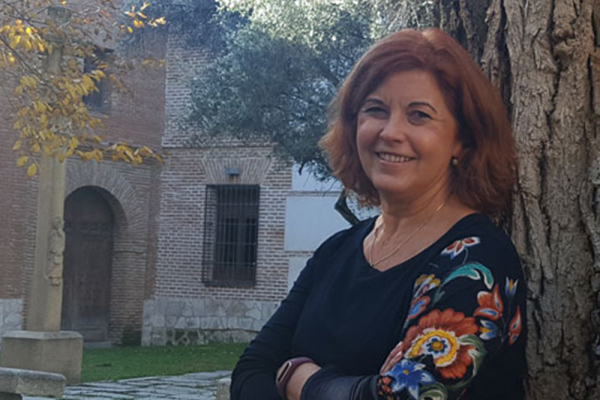‘Learning in a playful way probably helps to fix better ideas’
Mª Dolores Ruiz Berdún is a professor in the area of History of Science at the UAH and has been recognized with a second prize in the Awards for Promotion and Scientific Dissemination in the category 'Most original and innovative formula to spread science among society' for leisure activities in which she has participated to improve knowledge of obstetrics and promote a healthy childbirth.
- What does it mean for you to receive this recognition?
It's always nice to have your work recognized, but I think that, above all, it's good for people to know what you're working on. Many times we don't know what most colleagues do and I think that's important.
- Tell us what the initiative presented consisted of.
The initiative was part of my role as co-chair of the working group focused on the dissemination of a European project in which I have been participating in the last few years called COST Action IS1405 Building Intrapartum Through Health an interdisciplinary whole system approach to understanding and contextualising physiological labour and birth (Birth).
COST projects are very interdisciplinary and have to be focused on the transfer to society of research results, so we have made many initiatives to carry out this function: videos of the members of the research team, crosswords, a card game...
- What are the objectives of the COST projects? And more specifically this one for which you have been awarded?
These projects aim to promote cooperation between European researchers, mainly, but also outside Europe in any field of science and technology. But not only researchers, other social actors must also participate as managers and politicians and user groups to which the project is focused.
They have a duration of four years during which the exchange of ideas is promoted and multidisciplinary and inclusive research is facilitated. With a specific budget to support the career of young research staff, the outreach activities I have carried out and for which I have been awarded belong to a project whose objectives were focused on reducing the medicalization of childbirth and promoting decision-making by women and their families in their reproductive processes. At all times we have used a health-related approach, i.e. with a positive approach to health.
- Why did you think games would be a good one to improve knowledge of obstetrics and promote healthy delivery?
Learning in a playful way probably helps to fix better ideas. Games are a challenge and almost everyone likes challenges. We believe that improving the way babies come into the world can have a long-term effect on improving society. Because a happy pregnancy, birth and upbringing has very positive results on the future development of the babies and therefore of the society in which they will develop.
- What problems have pregnant women and first-time mothers faced during pandemic and confinement?
They have faced many problems unfortunately, and the worst part is that in some places things have not improved. At the beginning of the pandemic, one of the fundamental difficulties was the collapse of health care facilities and information phone lines. Here I have to remember that thanks to the volunteering of many people, there are hundreds of women who have not felt so alone. Volunteer families, such as those who form the Lactard breastfeeding and parenting support group, which I founded in 2007, and who over these years have helped thousands of women, have been crucial thanks to the telematic support they provided and continue to provide.
Moreover, the uncertainty of such an exceptional situation has affected us all, and even those who are involved in science of such an exceptional situation has affected us all, and even those who are engaged in science or the health professions have no answers. Fear has caused measures that violate women's fundamental rights in their births, such as not letting them be accompanied or separating them from their babies at birth. This runs counter to scientific evidence and the recommendations of the World Health Organization.
And the bad thing is that, as I say, there are still centers where they do not use these recommendations that should be universal. Hopefully they will be updated.
- Which projects do you currently work on?
This year I have begun to participate in two very different projects. One is another COST project, in which I also participate in the dissemination and transfer group, and which is focused on the study of the effects of obstetric trauma on families and professionals. Its title is CA18211 - Perinatal Mental Health and Birth-Related Trauma: Maximising best practice and optimal outcomes. The other project, in collaboration with researchers from the University of Castilla La Mancha and the University Miguel Hernández, and funded by the Spanish Ministry of Economy and Competitiveness, is entitled Fight against cancer and socio-cultural change in Spain (1939-1975): between fear and hope. I have just been elected secretary of the Spanish Society for the History of Science and Technology and coordinator of exchange programs for medical students, so I don't have time to get bored.
Publicado en: Inglés
